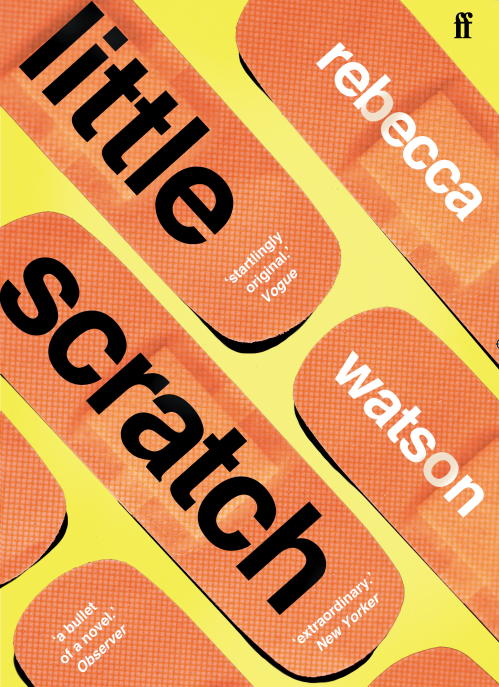“little scratch” by Rebecca Watson: The Dilemma to Speak Up or Stay Inspired (BOOK REVIEW)
The Dilemma to Speak Up or Stay Inspired
Hey, Alex! What have you been reading lately?
I went to a Faber event in late June where they showed me around their office at The Bindery in London. Naturally, I couldn’t resist not checking their selection of titles near the reception area and little scratch by Rebecca Watson was one of the books that stood out to me. I opened it at a random page and instantly got reminded of how much I love when form and story collide. Think of little scratch as a place to write down the whole chaos of your brain: every thought, worry, even the things you unconsciously register on the daily. The story pulled me in with its originality, freshness, and surprises, and it did not leave me disappointed.
Tell me more. What is the book about?
little scratch blurs the lines between fiction and poetry in a striking but accessible way. It serves as a stream of consciousness that covers a single day in the life of a woman who is trying to process the trauma of being sexually violated at work.
The whole narrative is a running commentary inside the mind of the nameless narrator. We start from the moment her alarm goes off in the morning and follow her through her usual routine - getting ready, commuting, completing tasks at work, scrolling on her phone, staying hydrated! Mundane events that we don’t pay much attention to but still shape us and our understanding of reality. Here, Watson breaks down the multiplicity of human existence into singular words, scratches even, so we can feel the anxieties of the character, her distractions, and the weight of what she’s not able to say out loud.
What are some strong and weak points of the book?
I often find it difficult to really get to grips with more experimental texts, but this one felt so fresh and uncomplicated. I loved how Watson plays with form. For example, sometimes the words split into two columns across the page to mimic a conversation, or to show how the narrator’s thoughts branch off while she reacts to the world in real time. People are talking at you or you’re reading through emails but your mind is elsewhere, and we see exactly that. little scratch is a testament of how much we have grown accustomed to multitasking, multithinking, and how we can hardly ever fully process what is happening to us.
I was blown away by how language can mirror different mental states in such honesty. When the narrator feels more anxious, the text gets chaotic, repetitive, circling around words and not-so important details. Then it slows down, becomes less overwhelming and describes events by using simple objects, actions, or sensory adjectives.
There isn’t anything I disliked about little scratch. However, I feel like some could critique its ending and the narrator’s inability to voice what is eating away at her and to ask for help. I believe that the silence persists for a reason; it opens space for creativity. The woman is finally able to write, she repeats multiple times, because of how emotionally charged she feels after the assault. The horrible experience opens a gnawing hole in her that she keeps scratching, unable to feel relief. It’s like she wants to stay this way to be able to continue to write, and this form of self-sabotage offers a very realistic representation of trauma.
Any final thoughts? Should I read it too?
Yes, but know what you’re getting into. little scratch deals with a very current, triggering issue that should never be overlooked. This isn’t a book about what happens, but how it feels for something like that to happen to you. Every itch of thought is recorded onto the page. For me, that’s what made it so gripping - seeing how one’s mind can carry trauma through the most ordinary of days, break it down and fail to understand it but still hold onto it.
Thank you so much!! Are there any similar books that you can recommend?
Sure thing! If you enjoyed little scratch, you might want to check out the following:
🍜 I Want to Die But I Want to Eat Tteokbokki by Baek Sehee — a depressed woman in her 20s records her therapy sessions as she learns how to appreciate life again.
🖋 Zong! by M. NourbeSe Philip — a poetic, fragmented retelling of the Zong massacre that stretches the limits of language and forces you to experience history yourself.
Happy reading!
📲 limaistyping…
rating: ☀️☀️☀️☀️
tropes: 🌄 day in the life | ✋ #MeToo | 🖋️ poetic fiction | 🌬️ stream of consciousness | 🎲 fragmented identity
read if you like: GRWM vlogs, habit trackers, overthinking, commutes, pub nights
look out for: 🚽 pee breaks | 🦵 the back of one’s knee | 🍤 prawn chowder | 📩 email history | 🚲 bike rides
"This felt like looking at life pass you by, and you’re eager to be part of it but something (yourself) is holding you back."
tropes: 🌄 day in the life | ✋ #MeToo | 🖋️ poetic fiction | 🌬️ stream of consciousness | 🎲 fragmented identity
read if you like: GRWM vlogs, habit trackers, overthinking, commutes, pub nights
look out for: 🚽 pee breaks | 🦵 the back of one’s knee | 🍤 prawn chowder | 📩 email history | 🚲 bike rides
"This felt like looking at life pass you by, and you’re eager to be part of it but something (yourself) is holding you back."
